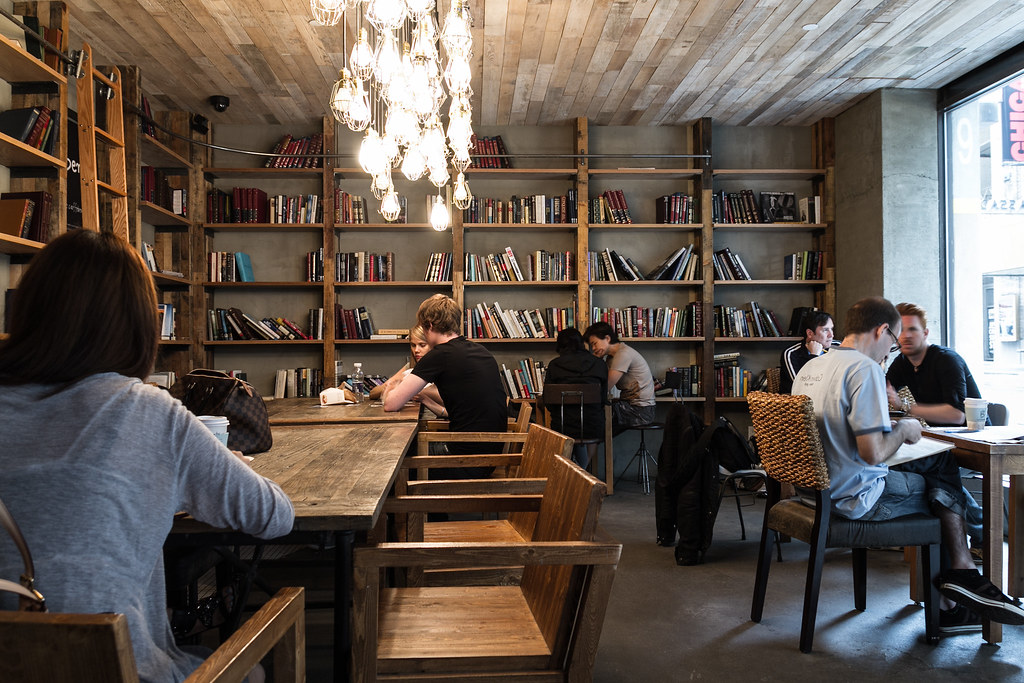It is a Wednesday morning in Columbia, South Carolina, and the weather outside is uncharacteristically dreary. It is one of those days when the wind whips through the tunnels created by downtown buildings, fall leaves that have turned brown fly from parked car to parked car on the side of the streets, and only a few people are feeling brave enough to venture outside their places of work. In many ways, it is the type of day local coffee shop owners dream about. On days when the outside world is chaotic, the hospitality of local coffee shops is particularly inviting.
The coffee shop I am working from today is a small establishment in downtown Columbia. Situated near the University of South Carolina, it is a common gathering place for students throughout the year. Often, they gather in large groups to hang out and sip coffee, but today is the week of finals and the mood is more serious. The coffee shop is also near several local churches in the city of various denominations. On most days, a dozen or so pastors slip through the doors to set up shop in what has become their unofficial office of sorts. Like any good community gathering place, this coffee shop breaks down barriers. Baptist pastors, Presbyterian pastors, engineering students, and art students learn each other’s names in a way that would be unlikely in any other sort of social arrangement. On one side of the coffee shop, a group of local business leaders meet to discuss funding for their next project. Sitting at the back table, two older folks are chatting over espresso. In an American moment characterized by division, the republic is alive and well on this December day in a Southern city.
The Republic of the United States, a political organization resting on the tenuous combination of state sovereignty and national unity, has always relied on robust social structures. Much has been written in the past few decades on the breakdown of traditional rhythms that united folks in the past, particularly social clubs and religious organizations. While every nation needs strong social structures, the importance of these institutions is particularly important in America. Despite the desire of Americans to speak of a common history, the uniting force that history provides in many other nations is simply impossible in America. A nation of immigrants, like the United States, creates a situation where the origin stories of our citizens are wildly different. For some, the story begins in the seventeenth century with ancestors traveling to the new world. For others, their story may include relatives coming to the U.S. as slaves during the eighteenth century or escaping a famine in Ireland during the mid-nineteenth century. Still others have a story that is much younger, such as the many Indian immigrants who came in the past twenty years to work in a variety of industries. Because America lacks a shared history that can adequately unite, our nation must rest on something else. For most of American history, this foundation has been community created by local gathering places.
The coffee shop culture of today was once found in the tavern culture of Colonial America. In 1634, Samuel Cole opened the first tavern in America in Boston. Cole was born in 1597 and arrived in Boston in 1630 with his wife and four children to begin a new life. While the area he arrived in was known as the Shawmut Peninsula at the time, it would be renamed Boston shortly after and would become the most important city in early Colonial America. Cole was a perceptive entrepreneur who was able to identify a need and opened an establishment known as Cole’s Inn in the center of the growing city in 1634. The tavern quickly became the hub of colonial life in Boston, and in 1645 he relocated his business to a more desirable location close to today’s Faneuil Hall. Cole’s tavern in downtown Boston was not the only establishment that popped up in Colonial New England. By 1655, the demand for taverns, also known as “ordinaries,” was so great that the Massachusetts General Court mandated that each town in the state had at least one tavern where citizens could congregate. While Puritan New England was built around local church life, these settlers knew the importance of informal gathering places where community could take root.
Why were taverns so popular in colonial America? Perhaps one reason was their formative nature in creating community. In a city like Boston where new residents were constantly joining the thriving young city, a place was needed to break down social barriers and create a sense of stability among the public. For the city, the colony, and the future Republic to survive, institutions had to be created that would form community networks deeper than mere business and political relationships. While church was certainly one of these institutions, the tavern allowed for residents of multiple churches and walks of life to come together to create a shared identity.
The community life that grew from tavern culture was robust. In many ways, the tavern was the foundation of business, political, social, and intellectual life in the early Republic, especially in New England. Along with alcoholic beverages, colonists were offered numerous important activities at taverns like the one Samuel Cole opened. These institutions offered colonists games, musical entertainment, countless types of discussion groups, and a place to receive news and debate public ideas. According to historian David Conroy, taverns helped redefine authority in the colonies as people lived daily life in a melting pot of different classes and professions. In many ways, the tavern in colonial America served as a major democratizing force in the new nation and fostered the egalitarian spirit of the future United States.
The comparison of modern coffee shops to colonial taverns is not perfect. Taverns, despite their benefits, were often places of public drunkenness and gambling. Often, prostitutes used taverns as a place to troll for clients to bring back to their brothels. Despite the sin in these places, it is without question that the tavern was an important factor in building community in American life. Likewise, today’s coffee shops function as places of community where powerful formation is happening. Like the tavern, local coffee shops in the United States have become places where business deals are executed, religious discipleship happens, and friendships are formed by those who would otherwise never meet. Perhaps just as important to community formation, these shops help local business leaders make a living and create jobs for community members. In some cases, like the coffee shop in Columbia I often visit, the coffee is brewed in-house and shipped to other parts of the state for sale. Not only is community and local business happening, but the coffee shop is also bringing attention to our growing city through its sale of coffee beans to other locations.
The reasons that taverns in the past and coffee shops today are foundational for the future success of our nation is twofold: both institutions break down social barriers and bring different types of people together. While political polarization is a major issue today, the more foundational problems are those that create the polarization. According to a study done by Duke University, one of the major problems driving polarization is the growing divide between social media and reality. In their research, they found that seventy-three percent of political tweets were derived from just six percent of Twitter (X) users. In addition, that six percent held mostly radical views. In a modern phenomenon, the masses attach themselves to the views of a radical minority while retreating from public interaction in any meaningful sense. While people are often careful to avoid extreme political discussion with the people in their community, social media creates a perfect environment to air the most extreme thoughts. Rather than forming opinions through interaction with community members, opinions are now formed through provocateurs online who care little about the repercussions.
In addition to polarization driven by social media, the “Loneliness Epidemic” continues to rage in the United States. Currently, twenty-one percent of Americans feel lonely and many of those feel disconnected from other people. Loneliness creates a variety of social problems. One example of its effect is that it exacerbates negative emotions that contribute to social decay, specifically hostility. In a study done by UCLA, researchers found that loneliness leads to increased hostility, which in turn creates more loneliness. This vicious cycle, combined with social media ranting, makes for an environment that poses a great threat to democracy. If democracy in our republic depends on some level of consensus, these social forces only work to alienate. Our culture needs to cultivate greater levels of understanding that can only come through relationships. Unfortunately, very few institutions are left that bring people together.
It is obvious that coffee shops alone cannot rebuild the United States. Even the term rebuild itself is open to interpretation and is largely used by politicians afraid of saying anything that is clear and concise. It is also true that America has always been a place of division. In Federalist #10, written by James Madison in 1787 to persuade states to join the new American union, the idea of “factions” or divisions was acknowledged. In his paper, factions were groups of people united by ideological belief. According to Madison, factions were best dealt with by a pluralistic society where no one faction gained complete control over the nation. Fortunately, Madison’s prediction has held true so far. The problem of division, however, can become so entrenched that healthy debate is no longer tolerated and even basic institutions like church and family are strained. At different times in the past decade, it seems as though America has come to this point.
While coffee shops will not save America, to the opportunities they provide to cultivate relationships among different types of people can improve our Republic. These relationships can heal communities in small ways as people make friends and discuss opposing views. The best way for this to happen is through a localist agenda that values community, local businesses, and a shared vision for a particular place. Local coffee shops, like taverns in the past, provide a service that the masses desire. Because of coffee’s popularity, coffee shops can draw people together like very few other modern institutions. In my experience, coffee has become the new social lubricant that opens the door for important relationships and discussions. The best place to unite America is not national politics, but local businesses that bring people together. Maybe the first step for American citizens is not posting on social media or campaigning for a candidate, but finding a local coffee shop and having some interesting discussions with new people.
Image Via: Flickr
.





3 comments
steve c
And let’s not forget how the coffee houses of London were hotbeds of idea sharing, learning, organizing, and general socializing.
https://en.wikipedia.org/wiki/English_coffeehouses_in_the_17th_and_18th_centuries
helen renell
The Marine Corps started as a meeting place in Philadelphia at Tun Tavern in 1775.
While in boot camp many years ago, they taught us the history of the Marine Corps as part of our training.
I loved your compare and contrast of both taverns and modern day coffee shops.
David Naas
The photograph illustrating this essay is to drool over. Coffeeshop AND bookstore. ‘T were paradise enow.
Comments are closed.